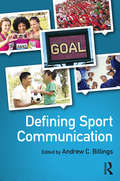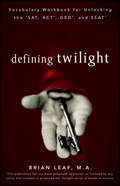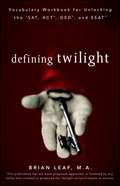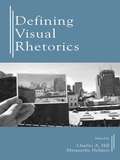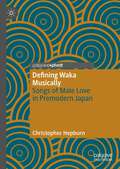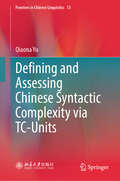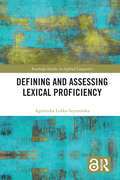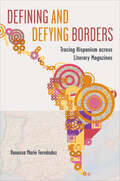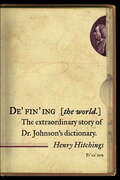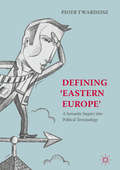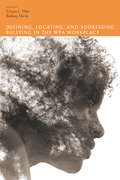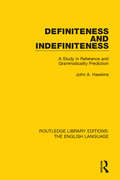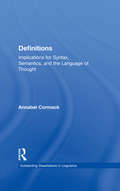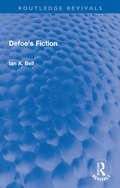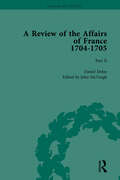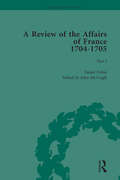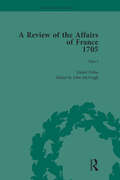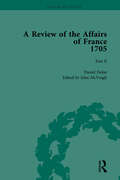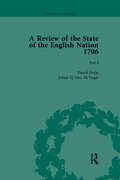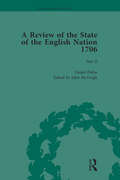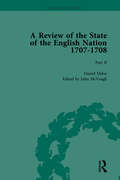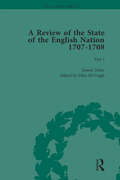- Table View
- List View
Defining Sport Communication
by Andrew C. BillingsDefining Sport Communication is a comprehensive resource addressing core topics and issues, including humanistic, organizational, relational, and mediated approaches to the study of sport communication. It provides foundational work in sport communication for students and scholars, reflecting the abundance of research published in recent years and the ever-increasing interest in this area of study. Bringing together scholars from various epistemological viewpoints within communication, this volume provides a unique opportunity for defining the breadth and depth of sport communication research. It will serve as a seminal reference for existing scholarship while also providing an agenda for future research.
Defining Twilight: Vocabulary Workbook For Unlocking The 'sat, Act', Ged', And Ssat'
by Brian LeafCan you resist the allure of Edward's myriad charms--his ocher eyes and tousled hair, the cadence of his speech, his chiseled alabaster skin, and his gratuitous charm? Will you hunt surreptitiously and tolerate the ceaselessdeluge in Forks to evade the sun and uphold the facade? Join Edward and Bella as you learn more than 600 vocabulary words to improve your score on the *SAT, ACT®, GED®, and SSAT® exams!Use this workbook side-by-side with your own copy of Stephenie Meyer's Twilight!Each chapter of the workbook gives you eight words taken from Twilight, with page references for you to read the words in the context of your favorite novelDefine the words on your own before turning back to the workbook for their actual definitionsAt the end of each section you'll take SAT, ACT, GED, and SSAT drills and quizzes to review and integrate what you've learnedPlus, you'll learn synonyms, Latin word parts, and memorization tools throughout the workbook
Defining Twilight: Vocabulary Workbook for Unlocking the *SAT, ACT®, GED®, and SSAT®
by Brian LeafCan you resist the allure of Edward's myriad charms--his ocher eyes and tousled hair, the cadence of his speech, his chiseled alabaster skin, and his gratuitous charm? Will you hunt surreptitiously and tolerate the ceaseless deluge in Forks to evade the sun and uphold the facade? Join Edward and Bella as you learn more than 600 vocabulary words to improve your score on the SAT, ACT, GED, and SSAT exams! Use this workbook side-by-side with your own copy of Stephenie Meyer's Twilight! * Each chapter of the workbook gives you eight words taken from Twilight, with page references for you to read the words in the context of your favorite novel * Define the words on your own before turning back to the workbook for their actual definitions * At the end of each section you'll take SAT, ACT, GED, and SSAT drills and quizzes to review and integrate what you've learned * Plus, you'll learn synonyms, Latin word parts, and memorization tools throughout the workbook.
Defining Visual Rhetorics
by Charles A. Hill Marguerite HelmersImages play an important role in developing consciousness and the relationship of the self to its surroundings. In this distinctive collection, editors Charles A. Hill and Marguerite Helmers examine the connection between visual images and persuasion, or how images act rhetorically upon viewers. Chapters included here highlight the differences and commonalities among a variety of projects identified as "visual rhetoric," leading to a more precise definition of the term and its role in rhetorical studies. Contributions to this volume consider a wide variety of sites of image production--from architecture to paintings, from film to needlepoint--in order to understand how images and texts work upon readers as symbolic forms of representation. Each chapter discusses, analyzes, and explains the visual aspect of a particular subject, and illustrates the ways in which messages and meaning are communicated visually. The contributions include work from rhetoric scholars in the English and communication disciplines, and represent a variety of methodologies--theoretical, textual analysis, psychological research, and cultural studies, among others. The editors seek to demonstrate that every new turn in the study of rhetorical practices reveals more possibilities for discussion, and that the recent "turn to the visual" has revealed an inexhaustible supply of new questions, problems, and objects for investigation. As a whole, the chapters presented here demonstrate the wide range of scholarship that is possible when a field begins to take seriously the analysis of images as important cultural and rhetorical forces. Defining Visual Rhetorics is appropriate for graduate or advanced undergraduate courses in rhetoric, English, mass communication, cultural studies, technical communication, and visual studies. It will also serve as an insightful resource for researchers, scholars, and educators interested in rhetoric, cultural studies, and communication studies.
Defining Visual Rhetorics
by Charles A. Hill Marguerite HelmersImages play an important role in developing consciousness and the relationship of the self to its surroundings. In this distinctive collection, editors Charles A. Hill and Marguerite Helmers examine the connection between visual images and persuasion, or how images act rhetorically upon viewers. Chapters included here highlight the differences and commonalities among a variety of projects identified as "visual rhetoric," leading to a more precise definition of the term and its role in rhetorical studies. Contributions to this volume consider a wide variety of sites of image production--from architecture to paintings, from film to needlepoint--in order to understand how images and texts work upon readers as symbolic forms of representation. Each chapter discusses, analyzes, and explains the visual aspect of a particular subject, and illustrates the ways in which messages and meaning are communicated visually. The contributions include work from rhetoric scholars in the English and communication disciplines, and represent a variety of methodologies--theoretical, textual analysis, psychological research, and cultural studies, among others. The editors seek to demonstrate that every new turn in the study of rhetorical practices reveals more possibilities for discussion, and that the recent "turn to the visual" has revealed an inexhaustible supply of new questions, problems, and objects for investigation. As a whole, the chapters presented here demonstrate the wide range of scholarship that is possible when a field begins to take seriously the analysis of images as important cultural and rhetorical forces. Defining Visual Rhetorics is appropriate for graduate or advanced undergraduate courses in rhetoric, English, mass communication, cultural studies, technical communication, and visual studies. It will also serve as an insightful resource for researchers, scholars, and educators interested in rhetoric, cultural studies, and communication studies.
Defining Waka Musically: Songs of Male Love in Premodern Japan
by Christopher HepburnThis book considers how music, musicality, and ideologies of musicality are working within the specific construction of waka on the theme of male love in Kitamura Kigin’s Iwatsutsuji (1676) and Ihara Saikaku’s Nanshoku ōkagami (1687) by using a modified generative theory of music. This modified theory seeks to get at the interdependent meanings that may exist among the music, image, and the text of the waka in question. In all, this study guides the reader through five waka on the theme of male love and demonstrates not only how each waka is inherently musical but how the image and text may interdependently relate to the ways in which premodern Japanese song poets may not only have thought in and with sound but may have also utilized a diverse array of musical gestures to construct new objects of knowledge. In the case of this study, these new objects of knowledge seem to have aided in situating a changing musicopoetics that aligned with changing constructions of male desire.
Defining and Assessing Chinese Syntactic Complexity via TC-Units (Frontiers in Chinese Linguistics #13)
by Qiaona YuThis book is a cutting-edge exploration of Chinese syntactic complexity by introducing a Chinese-language-specific approach, and providing a clear rationale and methodology for gauging syntactic complexity development along proficiency increase. It informs research and practice on assessment, proficiency scale and rubric descriptors, and task design for different language performances. This book appeals to a broad audience of researchers, not only those focused on Chinese and other Asian languages but also linguists, applied linguists, and language educators interested in understanding and measuring complexity.
Defining and Assessing Lexical Proficiency (Routledge Studies in Applied Linguistics)
by Agnieszka Leńko-SzymańskaThis comprehensive account of performance-based assessment of L2 lexical proficiency analyzes and compares two of the primary methods of evaluation used in the field and unpacks the ways in which they tap into different dimensions of one model of lexical competence and proficiency. This book builds on the latest research on performance-based assessment, which has most recently pointed to the application of more quantitative measures to L2 data, to systematically explore the qualitative method of using human raters in assessment exercises and the quantitative method of using automatic computation of statistical measures of lexis and phraseology. Supported by an up-to-date review of the existing literature, both approaches’ unique features are highlighted but also compared to one another to provide a holistic overview of performance-based assessment as it stands today at both the theoretical and empirical level. These findings are exemplified in a concluding chapter, which summarizes results from an empirical study looking at a range of lexical and phraseological features and human raters’ scores of over 150 essays written by both L2 learners of English and native speakers. Taken together, the volume challenges existing tendencies within the field which attempt to use one method to validate one another by demonstrating their capacity to indicate very different elements of lexical proficiency, thereby offering a means by which to better conceptualize performance-based assessment of L2 vocabulary in the future. This book will be of interest to students and researchers working in second language acquisition and applied linguistics research, particularly those interested in issues around assessment, vocabulary acquisition, and language proficiency.
Defining and Assessing Lexical Proficiency (Routledge Studies in Applied Linguistics)
by Agnieszka Leńko-SzymańskaThis comprehensive account of performance-based assessment of L2 lexical proficiency analyzes and compares two of the primary methods of evaluation used in the field and unpacks the ways in which they tap into different dimensions of one model of lexical competence and proficiency.This book builds on the latest research on performance-based assessment, which has most recently pointed to the application of more quantitative measures to L2 data, to systematically explore the qualitative method of using human raters in assessment exercises and the quantitative method of using automatic computation of statistical measures of lexis and phraseology. Supported by an up-to-date review of the existing literature, both approaches’ unique features are highlighted but also compared to one another to provide a holistic overview of performance-based assessment as it stands today at both the theoretical and empirical level. These findings are exemplified in a concluding chapter, which summarizes results from an empirical study looking at a range of lexical and phraseological features and human raters’ scores of over 150 essays written by both L2 learners of English and native speakers. Taken together, the volume challenges existing tendencies within the field which attempt to use one method to validate one another by demonstrating their capacity to indicate very different elements of lexical proficiency, thereby offering a means by which to better conceptualize performance-based assessment of L2 vocabulary in the future.This book will be of interest to students and researchers working in second language acquisition and applied linguistics research, particularly those interested in issues around assessment, vocabulary acquisition, and language proficiency.The Open Access version of this book, available at http://www.taylorfrancis.com, has been made available under a CC BY NC ND 4.0 license.
Defining and Defying Borders: Tracing Hispanism across Literary Magazines (LATINOAMERICANA)
by Vanessa FernándezTracing heated exchanges between Spanish and Latin American intellectuals that took place in journals, magazines, and newspapers in the early twentieth century, Defining and Defying Borders details how borders and boundaries were contested within a medium that simultaneously crossed borders and defined boundaries. Vanessa Marie Fernández demonstrates that print media is an invaluable resource for scholars because it offers a nuanced perspective of the complex postcolonial relationship between Spain and Latin America that shaped aesthetic production within and beyond national boundaries. Presenting inclusive paradigms that are at once able to transcend borders, acknowledge national boundaries, and account for empire, Defining and Defying Borders illustrates that investigating journals, magazines, and newspapers is crucial to better understanding postcolonial literary and cultural production.
Defining the World: The Extraordinary Story of Dr. Johnson's Dictionary
by Henry Hitchings&“[A] marvelous account&” of Johnson&’s towering achievement, nearly a decade of labor and linguistic fact-finding, presented by &“a buoyant, zestful writer&” (The Boston Globe). By the early eighteenth century, France and Italy had impressive lexicons, but there was no authoritative dictionary of English. Impelled by a mixture of national pride and commercial expedience, the prodigious polymath Samuel Johnson embraced the task, turning over the garret of his London home to the creation of his own giant dictionary. Johnson imagined that he could complete the job in three years. But the complexity of English meant that his estimate was wildly inadequate. Only after he had expended nearly a decade of his prime on the task did the dictionary finally appear—magisterial yet quirky, dogmatic but generous of spirit, and steeped in the richness of English literature. It would come to be seen as the most important British cultural monument of the eighteenth century, and its influence fanned out across Europe and throughout Britain&’s colonies—including, crucially, America. Brilliantly entertaining and enlightening, Defining the World is the story of Johnson&’s heroic endeavor. In alphabetically sequenced chapters, Henry Hitchings describes Johnson&’s adventure—his ambition and vision, his moments of despair, the mistakes he made along the way, and his ultimate triumph.
Defining ‘Eastern Europe’: A Semantic Inquiry Into Political Terminology
by Piotr TwardziszThis book offers a linguistic-semantic analysis of the expression ‘Eastern Europe’ in international English-language media discourse and academic discourse. Interdisciplinary in nature, it provides insights beyond semantics and lexicology, commenting on the politics, history, economy and culture of the region. Its thorough analysis of ‘Eastern Europe’ as a linguistic entity, surrounded and affected by other linguistic entities, allows for a systematic description of the term’s linguistic ‘behaviour’ in specialist written discourse. The author measures the ‘quantity’ and ‘quality’ of ‘Eastern Europe’ in specialist discourse, painting a holistic picture of how it appears in English-language quality texts published in the last twenty-five years. This book will appeal to students and scholars of cognitive linguistics, semantics, lexicology and lexicography, and to specialists working on history, political theory and international relations as they relate to Eastern Europe.
Defining, Locating, and Addressing Bullying in the WPA Workplace
by Cristyn L. Elder Bethany ElderDefining, Locating, and Addressing Bullying in the WPA Workplace is the first volume to take up the issue of bullying in writing programs. Contributors to this collection share their personal stories and analyze varieties of collegial malevolence they have experienced as WPAs with consequences in emotional, mental, and physical health and in personal and institutional economies. Contributors of varying status in different types of programs across many kinds of institutions describe various forms of bullying, including microaggressions, incivility, mobbing, and emotional abuse. They define bullying as institutional racism, “academic systemic incivility,” a crisis of insularity, and faculty fundamentalism. They locate bullying in institutional contexts, including research institutions, small liberal arts colleges, community colleges, and writing programs and writing centers. These locations are used as points of departure to further theorize bullying and to provide clear advice about agentive responses. A culture of silence discourages discussions of this behavior, making it difficult to address abuse. This silence also normalizes patterns and cultivates the perception that bullying arises naturally. Defining, Locating, and Addressing Bullying in the WPA Workplace helps the field to name these patterns of behaviors as bullying and resist ideologies of normalcy, encouraging and empowering readers to take an active role in defining, locating, and addressing bullying in their own workplaces. Contributors: Sarah Allen, Andrea Dardello, Harry Denny, Dawn Fels, Bre Garrett, W. Gary Griswold, Amy C. Heckathorn, Aurora Matzke, Staci Perryman-Clark, Sherry Rankins-Robertson, Erec Smith
Definiteness and Indefiniteness: A Study in Reference and Grammaticality Prediction (Routledge Library Editions: The English Language #11)
by John A. HawkinsFirst published in 1988, this book is concerned with the definite and indefinite articles in English. It provides an integrated pragmatic-semantic theory of definite and indefinite reference, on the basis of which, many co-occurance restrictions between articles and non-modifiers are explained. At the general theoretical level, this book looks at the role of semantics in the prediction of all and only the grammatical sentences of a language. A generalisation is proposed uniting semantic oppositions underlying ungrammaticality with syntactic oppositions between conditions of application on transformational generative rules. A procedure is suggested for distinguishing semantic from syntactic causes of ungrammaticality. At a more particular level, the book explores the nature of reference. It examines an important selection of subjects such as the contrast between definiteness and indefiniteness, the relationship between definite and demonstrative reference, and the relationship between pragmatic and logical aspects of determining meaning.
Definitions: Implications for Syntax, Semantics, and the Language of Thought (Outstanding Dissertations in Linguistics)
by Annabel CormackThe answer to the question "How can we understand and use a definition?" provides new constraints on natural language and on the internal language in which meaning is mentally represented. Most syntax takes the sentence as the basic unit for well-formedness, but definitions force us to focus on words and phrases, and hence to focus on compositional syntax in parallel with compositional semantics. This study examines both dictionary definitions and definitions from textbooks, from the points of view of their syntax, semantics, and use for learning word meaning. The tools used throughout are Principles and Parameters syntax, Relevance theoretic pragmatics, Model theoretic semantics, and the formal theory of definitions. The analyses argue that because phrases can be understood in isolation, some standard syntactic analyses must be modified. 'NP movement' has to be reanalysed as transmission of theta roles. These ideas are then applied to a variety of adjectives which take propositional complements. The final chapter argues that for definitions to be understood, the syntax of the Language of Thought must be close to that of Natural Language in specifiable way.
Defoe's America
by Dennis ToddThe Americas appear as an evocative setting in more than half of Daniel Defoe's novels, and often offer a new beginning for his characters. In the first full-length study of Defoe and colonialism, Dennis Todd explores why the New World loomed so large in Defoe's imagination. By focusing on the historical contexts that informed Defoe's depiction of American Indians, African slaves, and white indentured servants, Dennis Todd investigates the colonial assumptions that shaped his novels and, at the same time, uncovers how Defoe used details of the American experience in complex, often figurative ways to explore the psychological bases of the profound conversions and transformations that his heroes and heroines undergo. And by examining what Defoe knew and did not know about America, what he falsely believed and what he knowingly falsified, Defoe's America probes the doubts, hesitancies, and contradictions he had about the colonial project he so fervently promoted.
Defoe's Fiction (Routledge Revivals)
by Ian A. BellFirst published in 1985, Defoe’s Fiction explores Defoe’s work by considering it in the context of its genre. The book highlights the difficulty of placing Defoe’s fiction in the most appropriate context due to it being aimed primarily at a popular market, in contrast to the more literary productions of Pope, Swift, or Addison. It also comments on the trend of focusing on Defoe’s irony or emphasising his mimetic power. In doing so, it seeks to explain, rather than judge, Defoe’s achievement by looking at his whole body of work in the context of its genre. Defoe’s Fiction will appeal to those with an interest in Defoe, comparative literature, and the history of literary criticism.
Defoe's Review 1704-13, Volume 1 (Defoe's Review 1704–13)
by John McVeaghOne of Daniel Defoe's greatest achievements was the writing and publication of his "Review". Covering his many interests, both contemporary and historical, Defoe published his journal twice and latterly three times a week. This volume reproduces the "Review" from the year 1704.
Defoe's Review 1704-13, Volume 1 (Defoe's Review 1704–13)
by John McVeaghOne of Daniel Defoe's greatest achievements was the writing and publication of his "Review". Covering his many interests, both contemporary and historical, Defoe published his journal twice and latterly three times a week. This volume reproduces the "Review" from the year 1704.
Defoe's Review 1704-13, Volume 2 (Defoe's Review 1704–13)
by John McVeaghThis volume is an important and rare work in the political and literary history of England and for a Defoe scholar. It is one of the earliest examples of the political periodical, and includes discussions on the parliamentary election of 1705 and Defoe's weekly Scandal Club correspondence.
Defoe's Review 1704-13, Volume 2 (Defoe's Review 1704–13)
by John McVeaghDefoe's Review is one of the earliest examples of the political periodical which became popular in the 18th century, publishing a regular political essay and discussion on current affairs. This volume on France runs from February to December 1705 in 127 parts.
Defoe's Review 1704-13, Volume 3 (Defoe's Review 1704–13)
by John McVeaghOne of Daniel Defoe's greatest achievements was the writing and publication of his "Review". Covering his many interests, both contemporary and historical, Defoe published his journal twice and latterly three times a week. This volume reproduces the "Review" from the year 1704.
Defoe's Review 1704-13, Volume 3 (Defoe's Review 1704–13)
by John McVeaghOne of Daniel Defoe's greatest achievements was the writing and publication of his "Review". Covering his many interests, both contemporary and historical, Defoe published his journal twice and latterly three times a week. This volume reproduces the "Review" from the year 1704.
Defoe's Review 1704-13, Volume 4 (Defoe's Review 1704–13)
by John McVeaghCovering Daniel Defoe's many interests, both literary and historical, this edition is the fourth volume in "Pickering and Chatto's" 18-volume series.
Defoe's Review 1704-13, Volume 4 (Defoe's Review 1704–13)
by John McVeaghCovering Daniel Defoe's many interests, both literary and historical, this edition is the fourth volume in "Pickering and Chatto's" 18-volume series.
